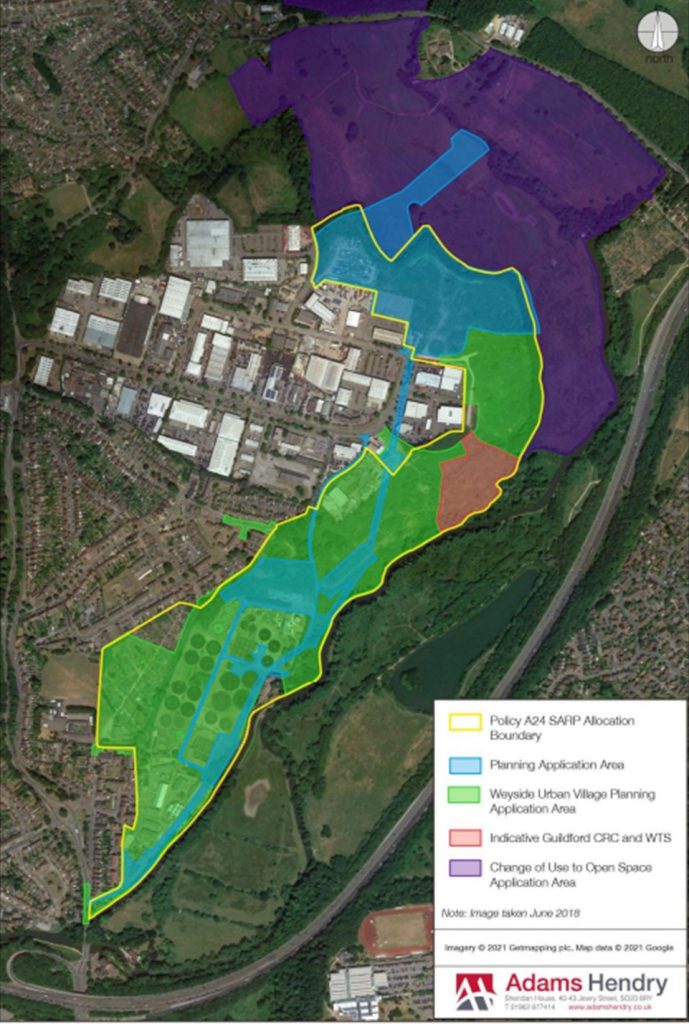 Abraham Lincoln
If given the truth, the people can be depended upon to meet any national crisis...
Abraham Lincoln
If given the truth, the people can be depended upon to meet any national crisis...
 Guildford news...
for Guildford people, brought to you by Guildford reporters - Guildford's own news service
Guildford news...
for Guildford people, brought to you by Guildford reporters - Guildford's own news service
Letter: What Will Be the True Price of This Vanity Project?
Published on: 15 Feb, 2022
Updated on: 16 Feb, 2022
From: Jim Allen
In response to: Plan for Guildford’s New Sewage Works Goes to County Council for Approval
So in order to build a ghetto with inadequate parking, and one direction transport disintegrated from the rail system, no drinking water and destroying a heritage asset the Wey Navigation by its very presence. Thames water a to build a new sewage treatment works in a new location when the old one should have been refurbished in 2005.
As a result, the Riverside Nature Reserve will be turned into a cycle super highway, along with a “towpath” possibly five metres wide from Stoke to Bowers Lock, 3,500 people adjacent to the only tranquil place for miles – a “Sustainable Alternative Natural Greenspace” on an active flood plain. There have been over 300 trees lost in the past 10 years along the Wey trying to prove the flood plain does not flood.
Some might accuse me of being negative but I am simply being practical!
I see this as an ongoing disaster, a project bereft of any moral sanity for a vain purpose which has little consideration for the people who are meant to be housed there: a numbers housing game where developers keep adding rabbit hutches until the cash matches cost, not real homes for real people.
There has been no proper consideration of the technical obstacles and the loss of the allotments is the biggest tragedy. But this is just another tragedy in the sad story of Guildford planning, organised by the same people who dropped the old footbridge into the Navigation recently at Walnut tree Close.
So yes “the project” moves forward at any cost but what is the moral cost, where is the social benefit, what price the destruction to our heritage?
Responses to Letter: What Will Be the True Price of This Vanity Project?
Leave a Comment Cancel reply
Please see our comments policy. All comments are moderated and may take time to appear. Full names, or at least initial and surname, must be given.
Click on cartoon for Dragon story: Public Asked for Views on SCC’s Proposal for Reduced Speed Limits






Recent Articles
- Revealed Survey Shows SCC’s Preferred Two-unitary Option Has Least Public Support
- Highways Bulletin: Junction 10 Closures and Making Strides for Walk to School Week
- New River Boats for Surrey Care Trust
- Body Found in Woodland Believed To Be Missing 69-year-old
- Guildford Choral Promises a Summer Evening Spectacular
- Volunteers Are Needed To Test My Wearable Wellbeing Technology
- Mayor’s Diary: May 23 – June 8
- Work to Repair Cottage on Closed A281 Underway
- Letter: Not All PIP Claimants Need It
- AI Technology at the Forefront of Surrey Conservation Project


Recent Comments
- Eric Gurney on Work to Repair Cottage on Closed A281 Underway
- Mark Coxhead on Major Disruption on the Railway During Hot Day in 1900
- Ian Stronge on Letter: Not All PIP Claimants Need It
- John Lomas on Work to Repair Cottage on Closed A281 Underway
- Stuart Taylor on Community Councils Proposed to Maintain Local Representation
- Stephanie Webster on Work to Repair Cottage on Closed A281 Underway
Search in Site
Media Gallery
Dragon Interview: Local Artist Leaves Her Mark At One of England’s Most Historic Buildings
January 21, 2023 / No Comment / Read MoreDragon Interview: Lib Dem Planning Chair: ‘Current Policy Doesn’t Work for Local People’
January 19, 2023 / No Comment / Read MoreA3 Tunnel in Guildford ‘Necessary’ for New Homes, Says Guildford’s MP
January 10, 2023 / No Comment / Read More‘Madness’ for London Road Scheme to Go Ahead Against ‘Huge Opposition’, Says SCC Leader
January 6, 2023 / No Comment / Read MoreCouncillor’s Son Starts Campaign for More Consultation on North Street Plan
December 30, 2022 / No Comment / Read MoreCounty Council Climbs Down Over London Road Works – Further ‘Engagement’ Period Announced
December 14, 2022 / No Comment / Read MoreDragon Interview: GBC Reaction to the Government’s Expected Decision to Relax Housing Targets
December 7, 2022 / No Comment / Read MoreHow Can Our Town Centre Businesses Recover? Watch the Shop Front Debate
May 18, 2020 / No Comment / Read More







Jules Cranwell
February 16, 2022 at 6:13 am
Has anybody considered whether anybody would want to live on what might be highly contaminated land?
John Tester
February 16, 2022 at 11:47 am
People who have no accommodation.
John Phelps
February 16, 2022 at 1:15 pm
Jules Cranwell doesn’t want houses on former green belt land outside his house. He now doesn’t want them on brownfield sites either. Can I ask, where does he expect the next generation to live?
This Nimbyism from people who already own homes is becoming incredibly boring.
Ben Paton
February 17, 2022 at 7:59 am
Repeated ad hominem attacks from people who dont have the wit to come up with reasoned arguments are even more boring.
Keith Reeves
February 16, 2022 at 10:10 pm
As Jim has admitted recently on this website he does like to stir, so we can never be truly sure of his views. However, the points he’s probably trying to make here are lost in the random stream of consciousness.
Keith Reeves
February 16, 2022 at 10:14 pm
Have you considered that it’s perfectly possible to remediate contaminated sites? It’s quite a routine activity, even on sites with a far greater degree of contamination than is the case here.
Martin Elliott
February 17, 2022 at 6:04 pm
Has Mr Cranwell checked the 425+ documents in the Planning File? Site surveys and remediation plans are more than likely in there.
Of course, it’s easier to ask than check the documentation.
Contaminated site remediation is a mature technology. An example is the Olympic 2012 site. More than 80 per cent was treated and remained on-site.
John Perkins
February 17, 2022 at 9:12 am
What is truly boring is the old, old accusation that anyone with concerns about unconstrained building is a ‘Nimby’.
Can I ask John Phelps how he intends addressing the many inherent problems? Sewage, for example?
David Roberts
February 18, 2022 at 6:23 pm
“Nimby” is always an unacceptable term of abuse, regardless of the user’s intention – like calling someone a “chav” or “snowflake.”
It is not a neutral term but a faux-jocular insult used to belittle the opinions, correct or not, of those who are entitled to hold them. More often than not, these are inoffensive elderly people who just want a quiet life.
“Nimby” is a lazy word that only reduces the force of its user’s argument. It is therefore not just rude but counter-productive.
Caroline Perkins
February 19, 2022 at 8:44 pm
I agree with David Roberts, “Nimby” is really a lazy term to use.
A better term for Jules Cranwell’s ideas on where housing should go would be “NOTE”, ie Note Over There Either. Surely, as a supporter of the Save the Hogs Back campaign he should welcome brownfield development.
The Weyside Urban Village site has been carefully laid out so that industrial buildings will be built on the most polluted parts of the site which is why the GBC depot is being moved elsewhere as part of the project.
As other contributors have said, cleaning up contaminated brownfield sites these days is fairly standard practice. This is something that must be done if we want to protect the green fields and landscape we are lucky to have in this borough.
Jules Cranwell
February 21, 2022 at 12:57 pm
I do not support any level of inappropriate development in the borough, as the South East is dangerously overpopulated already, and “levelling up” can never be achieved if we continue to allow developers to build where their greed ensures the highest profits. Such overdevelopment only exacerbates north to south migration, rather than stems it.
F M Robertson (Mrs)
March 10, 2022 at 3:50 pm
This 100-year-old allotment, to be largely sacrificed for this plan, is not a brownfield site. It is a cultivated green field with a few innocuous sheds on it.
Cultivated green fields should be preserved. I am a supporter of the Save the Hog’s Back campaign as a consequence. It is troubling to see that other supporters don’t appreciate that large arable fields are not the only way to cultivate the land.